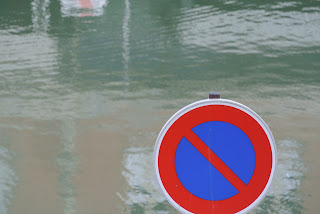 |
| "Stop Reflection" Canal St Martin, Paris 2015 |
Does this mean that no one has written memoir in French? Not at all. But the tendency in French literature is towards either fiction or autobiography - autobiography being more a factual description of the entire life of someone famous, written by themselves. While personal essays certainly exist, the tendency with essays and other personal writing is more towards intellectual writing.
And the word "memoire" - which means "memory" - refers to a very academic project, akin to someone's thesis or dissertation.
When I say in French literature, I literally mean literature written in French, from France - not meaning "outre-mer", Canadian, or post-colonial literature, aka "Francophone." There you can find stronger examples - Dany Laferriere's writing, for instance, which skirts the lines between memoir and fiction. He is a Haitian writer who began writing in earnest once he exiled to Quebec. But for the most part, only famous people have gotten away with anything akin to what we would call memoir. Simone de Beauvoir, so famous for her huge feminist tome The Second Sex, wrote four great memoirs; though they are referred to as a four-volume autobiography, they often have more the tone of memoir . However, your average person couldn't get away with publishing something so personal, so akin to what we call memoir in the States.
My French students are hungry for it, though. They desperately want to be able to write their own stories, whether or not they get published. In fact, they have an even more realistic understanding that they may not get published. They are blown away by the idea that others write this kind of thing, that others want to read it, in a more fundamental way that the average self-doubting American is blown away by reading memoir or hearing about it.
I am excited to dig into this exploration with them, a firmly new ground. I know others have come before, and I can't wait to find them. I know others must be doing similar things, and I am lined up to collaborate. Let's get deep into memories, stories we tell ourselves about ourselves, and all the good ground of life that French minds will love to explore.
